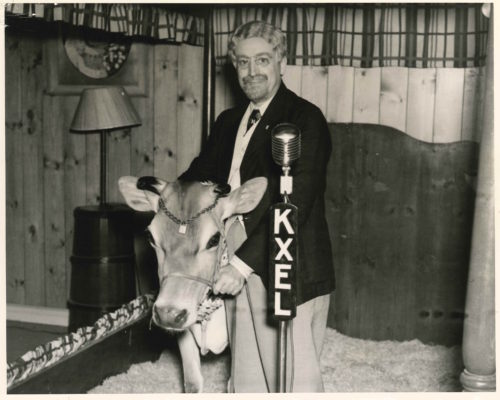How Joe DuMond used his national radio fame to create a powerhouse Waterloo station

DuMond frequently appeared in public in full costume as “Josh Higgins,” parlaying his national fame portraying that character into success for his fledgling Waterloo-based radio station, KXEL. Here, DuMond-as-Higgins is seen posing with one of the stars of the National Dairy Cattle Congress in Waterloo in the mid-1940s. Photo courtesy of Grout Museum District, Waterloo, Iowa
By Jeff Stein
As a boy growing up in Black Hawk County, Joe DuMond never considered a career in radio — since it had yet to be invented.
But once it was, he soon found the new medium perfectly suited to his talents as a musician, storyteller and promoter, leading to the creation of a nationally-distinct radio station in his home area.
DuMond’s radio station, KXEL, first took to the air on July 14, 1942, from studios in downtown Waterloo and on the campus of what was then Iowa State Teachers College in Cedar Falls. It was the first station in the country to be granted the maximum 50,000 watts of power with its original license, broadcasting from towers and transmitters just north of Dysart. But were it not for a series of accidents and good fortune, DuMond might have remained a touring musician instead of a groundbreaking broadcaster.
DuMond was born in Finchford, a small town in the northwest corner of Black Hawk County, on Nov. 21, 1898, the son of Mr. and Mrs. E.D. DuMond. The family moved to Waterloo when DuMond was seven years old; he graduated from East High School there in 1918.
He developed a knack for music while still a boy; his first piano accompanist, Irene Rohde, became his wife in 1923, midway through the 10 years he spent using his music and speaking skills as a versatile touring performer. He wrote the libretto for “The Life of Stephen Foster” and the music for the operetta “In Romany,” both of which enjoyed long national runs. He was also the composer of some 60 hymns, including the popular “By the Bend of the River,” a nod to his childhood in Finchford.
The grind of a national performance schedule was beginning to wear on DuMond when in the fall of 1928 he learned that the owner of the Waterloo Morning Tribune newspaper had moved a Cedar Rapids radio station to Waterloo. The life of a performer on the road was not easy, so DuMond jumped at the chance to join the staff of the new radio station — WMT — finding himself on the ground floor of a medium that was barely a decade old.
As the 1930s began, radio station programming was made up mainly of live performances, with announcers playing recordings at off times. One night, after becoming bored with playing the same records repeatedly, DuMond happened upon an idea that changed his life.
“I will never know what caused me to put aside the records and start talking about my youth — recalling the days in Finchford when I went to the meeting of the Ladies’ Aid Society with my mother, taking part in the goings on of the village. In fact, experiencing a kind of rebirth by the bend of the river,” he said.
TO READ THE ENTIRE STORY AND OTHER FASCINATING STORIES ABOUT IOWA HISTORY, subscribe to Iowa History Journal. You can also purchase back issues at the store.
